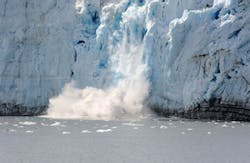A new report from the U.S. Department of Energy has warned of the threats that climate change poses to the U.S. energy sector. Over the past few years, the changing face of the American energy market has been influenced by heat, water shortages, rising sea levels and intense storms, which have all put a strain on the energy system. Failure to tackle climate change and to adapt to the shifting conditions will add further pressure in the future, the report stated.
These four factors have been identified as the main trends in climate change that will continue to challenge both the public and private sectors. When heat, drought, storms and rising seas are combined they can have a devastating effect on the U.S. energy sector, but even independently each one of them is a potential obstacle to the country's effective ability to produce electricity from fossil fuels, nuclear and renewable sources, the Department of Energy claimed.
In order to deal with these threats, the rate at which the industry is adapting needs to increase, as the sector is going through more changes at the moment. The report pointed out that rising temperatures would alter conventional patterns of energy demand, while energy supplies from unconventional sources, such as the hydrocarbons in shale rock, are placing new strain on U.S. supplies of water, an essential ingredient for energy production.
Authors of the report recommend a number of strategies for adaptation, including introducing water-efficient technologies across the sector, implementing national policies that encourage more sophisticated infrastructure design and siting, as well as improved data and modeling.
RELATED: Obama to press ahead with carbon emissions reduction
The report also provides a list of 30 events that took place over the last decade which have put pressure on the nation's energy system. Most of the examples were taken over the last three years, when a series of droughts, floods and hurricanes made many Americans become aware of climate change the hard way.
Some of these instances were linked to the effect of high temperatures on energy facilities. In August 2012, Connecticut's Millstone Nuclear Power Plant had to shut down one of its reactors because the temperature of the intake cooling water, taken from the Long Island Sound, exceeded the technical specifications of the reactor. In July last year, eight power plants in Illinois needed a special permit from the state Environmental Protection Agency to allow higher water temperature discharge levels because the temperature of their cooling water pond was regulated to prevent adverse ecological impacts.
Other examples of adverse effects on energy production listed in the report were related to water scarcity. In July 2012, when the United States was going through one of the worst droughts in its history, fracking companies in Kansas, Texas, Pennsylvania and North Dakota were denied access to water for a period of six weeks. In other states, natural gas and oil companies had to pay higher water costs. In the fall of 2011, Grand Prairie, Texas, became the first U.S. municipality to ban the use of city water for hydraulic fracturing as a means to relieve the stress on the city's water supply system.
